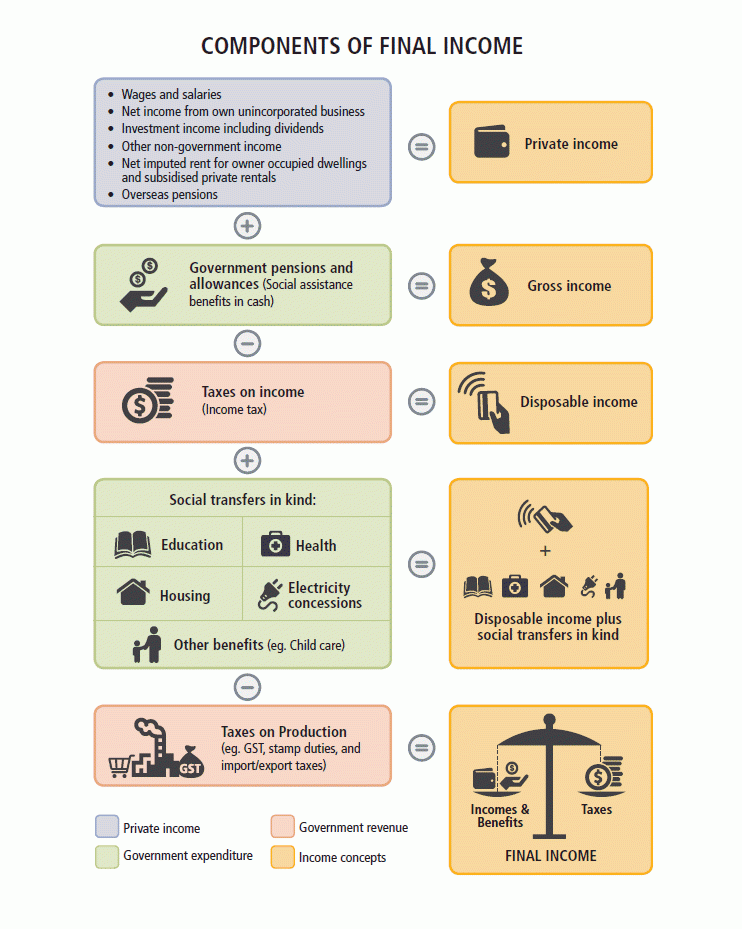Introduction
This publication presents results from a Fiscal Incidence Study (FIS) undertaken to show the effects of government benefits and taxes on the distribution of income among private households in Australia in 2015-16. Previous studies were conducted in 1984, 1988-89, 1993-94, 1998-99, 2003-04 and 2009-10.
Household income is increased directly by the Australian government through social assistance benefits in the form of cash payments, such as the Age Pension and Family Tax Benefit, and indirectly by government expenditures such as those on health and education. On the other hand, household income is reduced by taxes on personal income (direct taxes) and by taxes on production (indirect taxes) passed on in the prices households pay for goods and services. This study shows the effect on household incomes after taking both government benefits and taxes into account.
The FIS excludes government taxes and expenditure that do not relate directly to particular types of households or household expenditure, such as government revenue from corporate taxes and spending on defence, public order and safety, transport and communications.
The three major data sources used in the FIS were the 2015–16 ABS Household Expenditure Survey (HES), ABS Government Finance Statistics (GFS), and Input-Output tables from the Australian System of National Accounts (ASNA).
The concepts and definitions relating to all measures of income, government benefits and taxes are described in the following section.
Income concepts and components
The following diagram illustrates the different components of final income:
Image

Description
These components and their concepts are described further below.
Private income
The most restricted concept of income used in the FIS is referred to as private income, while the most extensive is final income. Private income is all current receipts, whether monetary or in kind. Private income includes wages and salaries, profit/loss from own unincorporated business, net investment income, private transfers and overseas pensions. Australian government benefits are not included.
It also includes net imputed rent for owner occupied dwellings and for subsidised private rentals to allow for more meaningful comparisons of the income circumstances of people living in different tenure types.
Social assistance benefits in cash
Cash payments to persons from general government without any requirement to provide goods and services in return. Included are pensions and allowances received by aged, disabled, unemployed and sick persons, families and children, veterans or their survivors, and study allowances for students. Family Tax Benefit, Newborn supplement or Newborn Upfront payment and Child Disability Assistance Payment paid to recipients of Carer Allowance are also included as social assistance benefits in cash. Payments are limited to those collected in the HES and exclude some transfers e.g. support from the National Disability Insurance Scheme.
Gross income
Gross income is the sum of private income and social assistance benefits in cash.
Disposable income
Disposable income is derived by subtracting estimates of taxes on personal income from gross income.
Disposable income plus social transfers in kind
Social transfers in kind (STIK) consist of goods and services provided free or at subsidised prices by the government. In the FIS, these are restricted to those arising from the provision of education, health, housing, social security and welfare services, and electricity concessions and rebates. STIK includes reimbursements of approved expenditures such as the Medicare rebate, the Private Health Insurance Rebate, the Child Care Benefit and the Child Care Rebate. Support from the National Disability Insurance Scheme has not been included due to limitations in HES data that would enable accurate allocation of these transfers (such as disability information for children aged under 15 years in the household). The cost of administering the provision of social assistance benefits in cash is included.
The value of government social transfers in kind is added to disposable income to derive disposable income plus STIK.
Taxes on production
Taxes on production and imports consist of taxes payable on goods and services when they are produced, delivered, sold, transferred or otherwise disposed of by their producers plus taxes and duties on imports that become payable when goods enter the economic territory by crossing the frontier or when services are delivered to resident units by non-resident units; they also include other taxes on production, which consist mainly of taxes on the ownership or use of land, buildings or other assets used in production or on the labour employed, or compensation of employees paid.
Disposable income
The value of government social transfers in kind for education, health, housing, social security and welfare, and electricity concessions and rebates (indirect benefits) is added to disposable income to derive disposable income plus social transfers in kind.
Final income
Final income is equal to disposable income plus social transfers in kind less taxes on production.